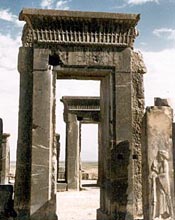
|


|
|
|
Mr. Sedivy's
More Features: |
Highlands Ranch High School - Mr. Sedivy
World
History The Golden Age The empire was built because Persia was still somewhat of a threat. Sparta and Athens built alliances with other city-states. The Delian League met on the island of Delos. There were now over 150 city-states. Athens dominated and made others pay tributes of ships, soldiers, and money, and they wouldn't let anyone leave.
Education Citizenship and Government 1. Only adult men were full citizens. 2. Athenians thought women were inferior. Aristotle wrote: "One rules, the other is ruled. Women couldn't participate in government, play sports, be in drama festivals, an got no formal education. 3. Foreigners could not take part. 4. Slaves could not take part.
Pericles Aspasia Pericles fell in love with her, divorced his wife, and moved in with Aspasia. She is the one who wrote most of his famous speeches. The people of Athens were mad, but Pericles was too powerful for the people to attack, so they went after Aspasia. She was the butt of jokes in plays and poems. She was put on trial for blaspheming the gods. During the trial, she gave such an impassioned defense, that everyone, including Pericles, cried. She was set free, but this hurt Pericles' reputation. Aspasia was one of the first women to be run through the whole gauntlet because of her independence and her self-reliance. The Peloponnesian War
Sparta won when they destroyed the Athenian navy in 404 BC. Sparta had given Athens many chances at peace, but Athens refused. Being so accustomed to success, Athens didn't want to take the chance. The 27-Year War included many city-states. This led to fighting even between some city-states, over democracy versus aristocratic rule. This contributed to the take over - Sparta was taken over by Thebes. Macedonia 1. Introduction to Classical Greece 2. Peoples of Ancient Greece: 3. The Development of Greek
City States: 4. Athenian Empire - The Golden Age Historical Periods of | Prehistory
| Mesopotamia & Phoenicians |
|
Highlands Ranch High School ![]() 9375 South Cresthill Lane
9375 South Cresthill Lane ![]() Highlands Ranch, Colorado 80126
Highlands Ranch, Colorado 80126 ![]() 303-471-7000
303-471-7000
Mr. Sedivy's History Classes
| Colorado History | American
Government | Modern European History | Advanced
Placement European History | Rise of England
| World History |
| Home | Back to top of page |
Site Contents |




